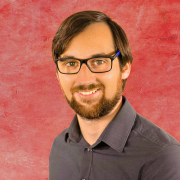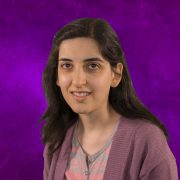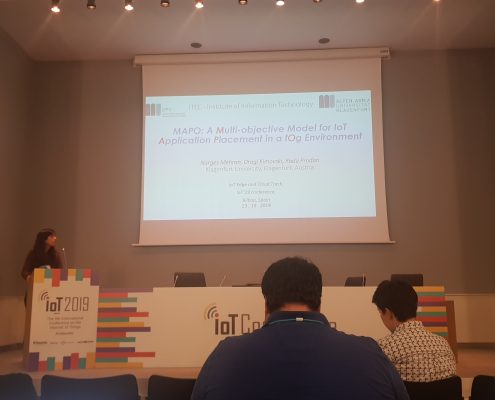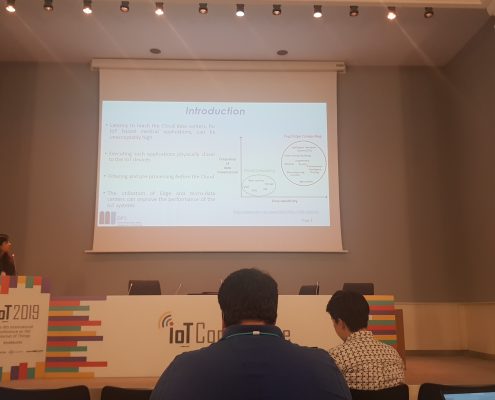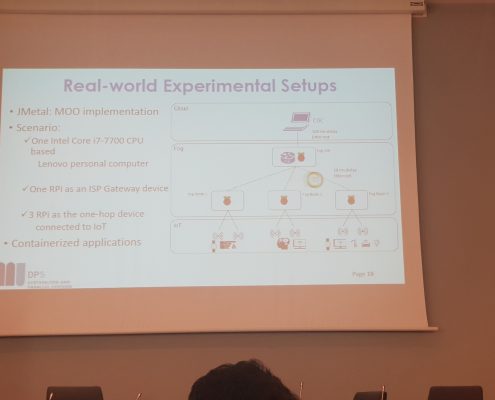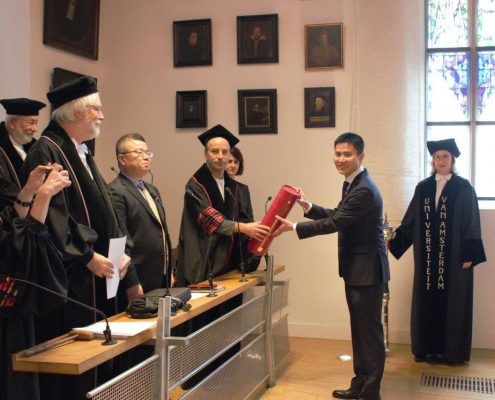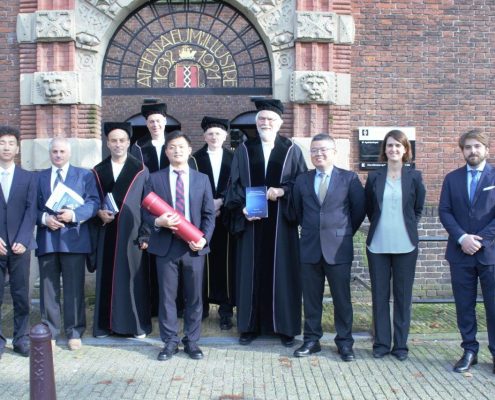The paper “Making simulation results reproducible—Survey, guidelines, and examples based on Gradle and Docker” has been accepted and published in PeerJ Computer Science.
Authors: Wilfried Elmenreich, Philipp Moll, Sebastian Theuermann, Mathias Lux (Alpen-Adria-Universität Klagenfurt)
Abstract: This article addresses two research questions related to reproducibility within the context of research related to computer science. First, a survey on reproducibility addressed to researchers in the academic and private sectors is described and evaluated. The survey indicates a strong need for open and easily accessible results, in particular, reproducing an experiment should not require too much effort. The results of the survey are then used to formulate guidelines for making research results reproducible. In addition, this article explores four approaches based on software tools that could bring forward reproducibility in research results. After a general analysis of tools, three examples are further investigated based on actual research projects which are used to evaluate previously introduced tools. Results indicate that the evaluated tools contribute well to making simulation results reproducible but due to conflicting requirements, none of the presented solutions fulfills all intended goals perfectly.
The full paper can be found on: https://peerj.com/articles/cs-240/
Authors: Hadi Amirpour, Ekrem Çetinkaya (Alpen-Adria-Universität Klagenfurt), Christian Timmerer (Alpen-Adria-Universität Klagenfurt, Bitmovin), and Mohammad Ghanbari (University of Tehran, University of Essex)
Abstract: Adaptive HTTP streaming is the preferred method to deliver multimedia content on the internet. It provides multiple representations of the same content in different qualities (i.e., bit-rates and resolutions) and allows the client to request segments from the available representations in a dynamic, adaptive way depending on its context. The growing number of representations in adaptive HTTP streaming makes encoding of one video segment at different representations a challenging task in terms of encoding time-complexity. In this paper, information of both highest and lowest quality representations are used to limit Rate Distortion Optimization (RDO) for each Coding Unit Tree (CTU) in High Efficiency Video Coding. Our proposed method first encodes the highest quality representation and consequently uses it to encode the lowest quality representation. In particular, the block structure and the selected reference frame of both highest and lowest quality representations are then used to predict and shorten the RDO process of each CTU for intermediate quality representations. Our proposed method introduces a delay of two CTUs thanks to employing parallel processing techniques. Experimental results show a significant reduction in time-complexity over the reference software (38%) and state-of-the-art (10%) is achieved while quality degradation is negligible.
Keywords: HTTP adaptive streaming, Multi-rate encoding, HEVC, Fast block partitioning
The PhD defense is in progress. @ilyushkin of @LargeResearch and @EEMCS_TUD discusses his work with @RaduProdanAAU. Science at work. pic.twitter.com/ubSZoXRYCR
— Alexandru Iosup (@AIosup) December 19, 2019
The paper has been accepted (through double-blind peer review) as a regular paper of the Euromicro PDP’2020 conference to be held in Vasteras, Sweden on 11-13 March, 2020.
Title: M3AT: Monitoring Agents Assignment Model for Data-Intensive Applications
Authors: Vladislav Kashansky, Dragi Kimovski, Radu Prodan, Prateek Agrawal, Fabrizio Marozzo, Iuhasz Gabriel, Marek Justyna and Javier Garcia-Blas
Abstract: Nowadays, massive amounts of data are acquired, transferred, and analyzed nearly in real-time by utilizing a large number of computing and storage elements interconnected through high-speed communication networks. However, one issue that still requires research effort is to enable efficient monitoring of applications and infrastructures of such complex systems. In this paper, we introduce a Integer Linear Programming (ILP) model called M3AT for optimised assignment of monitoring agents and aggregators on large-scale computing systems. We identified a set of requirements from three representative data-intensive applications and exploited them to define the model’s input parameters. We evaluated the scalability of M3AT using the Constraint Integer Programing (SCIP) solver with default configuration based on synthetic data sets. Preliminary results show that the model provides optimal assignments for systems composed of up to 200 monitoring agents while keeping the number of aggregators constant and demonstrates variable sensitivity with respect to the scale of monitoring data aggregators and limitation policies imposed.
Keywords: Monitoring systems, high performance computing, aggregation, systems control, data-intensive systems, generalized assignment problem, SCIP optimization suite.
Acknowledgement: This work has received funding from the EC-funded project H2020 FETHPC ASPIDE (Agreement #801091)
Narges Mehran presented the paper “MAPO: A Multi-Objective Model for IoT Application Placement in a Fog Environment” at the 9th International Conference on the Internet of Things, IoT 2019 in Bilbao, Spain (October 22-25, 2019).
Authors: Narges Mehran, Dragi Kimovski, Radu Prodan (Alpen-Adria Universität Klagenfurt).
Abstract: The emergence of the Fog computing paradigm that leverages in-network virtualized resources raises important challenges in terms of resource and IoT application management in a heterogeneous environment with limited computing resources. In this work, we propose a novel Pareto-based approach for application placement close to the data sources called Multi-objective IoT Application Placement in fOg (MAPO). MAPO models applications based on a finite state machine using three conflicting optimization objectives, completion time, energy consumption, and economic cost, and considering both the computation and communication aspects. In contrast to existing solutions that optimize a single objective, MAPO enables multi-objective energy and cost-aware application placement. To evaluate the quality of the MAPO placements, we created both simulated and real-world testbeds tailored for a set of medical IoT application case studies. Compared to the state-of-the-art approaches, MAPO reduces the economic cost by 28%, while decreasing the energy requirements by 29-64% on average, and improves the completion time by a factor of six.
Track: IoT Edge and Cloud @IoT’19
Acknowledgement: Austrian Research Promotion Agency (FFG), project 848448, Tiroler Cloud, funded this work.
Prof. Radu Prodan participated at the PhD examination of Dr. Yang Hu and Dr. Huan Zhou at the University of Amsterdam, Netherlands.
With: Prof. Peter van Emde Boas, Prof. Cees de Laat, Prof. Henri E. Bal, Dr. Paola Grosso, Dr. Zhiming Zhao, Prof. Rob van Nieuwpoort, Prof. Pieter Adriaans, Dr. Adam S.Z. Belloum
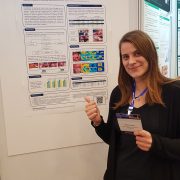
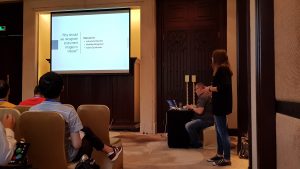 Sabrina Kletz presented the paper “Learning the Representation of Instrument Images in Laparoscopy Video” at the MIAR Workshop @ MICCAI 2019 in Shenzhen, China.
Sabrina Kletz presented the paper “Learning the Representation of Instrument Images in Laparoscopy Video” at the MIAR Workshop @ MICCAI 2019 in Shenzhen, China.
Authors: Sabrina Kletz, Klaus Schoeffmann, Heinrich Husslein
Abstract: Automatic recognition of instruments in laparoscopy videos poses many challenges that need to be addressed like identifying multiple instruments appearing in various representations and in different lighting conditions which in turn may be occluded by other instruments, tissue, blood or smoke. Considering these challenges it may be beneficial for recognition approaches that instrument frames are first detected in a sequence of video frames for further investigating only these frames. This pre-recognition step is also relevant for many other classification tasks in laparoscopy videos such as action recognition or adverse event analysis. In this work, we address the task of binary classification to recognize video frames as either instrument or non-instrument images. We examine convolutional neural network models to learn the representation of instrument frames in videos and take a closer look at learned activation patterns. For this task, GoogLeNet together with batch normalization is trained and validated using a publicly available dataset for instrument count classifications. We compare transfer learning with learning from scratch and evaluate on datasets from cholecystectomy and gynecology. The evaluation shows that fine-tuning a pre-trained model on the instrument and non-instrument images is much faster and more stable in learning than training a model from scratch.
Conference: 2019 International Conference on Medical Image Computing and Computer Assisted Intervention (MICCAI), October 13–17, 2018, Shenzhen, China
Track: Medical Imaging and Augmented Reality (MIAR) Workshop @MICCAI
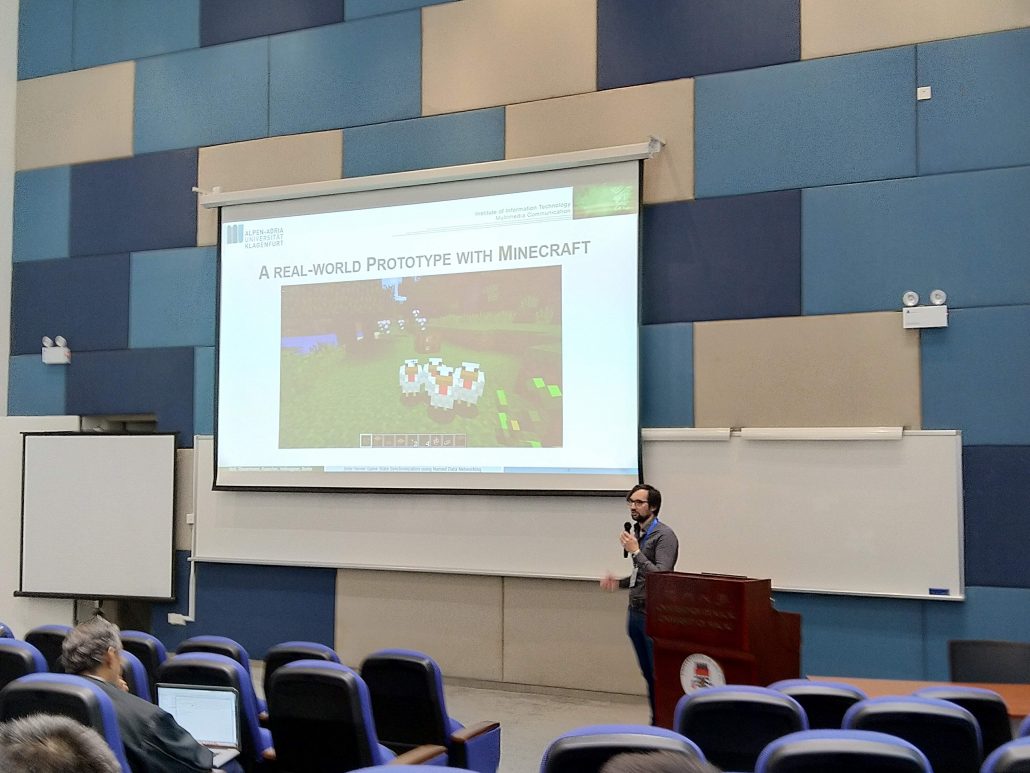 Philipp Moll presented the paper “Inter-Server Game State Synchronization using Named Data Networking” on the ACM Conference on Information-Centric Networking 2019 in Macau, China.
Philipp Moll presented the paper “Inter-Server Game State Synchronization using Named Data Networking” on the ACM Conference on Information-Centric Networking 2019 in Macau, China.
Authors: Philipp Moll, Sebastian Theuermann, Natascha Rauscher, Hermann Hellwagner (Alpen-Adria-Universität Klagenfurt), Jeff Burke (UCLA)
Abstract: In this paper, we develop a system for inter-server game state synchronization using the NDN architecture. We use Minecraft as a real-world example of online games and extend Minecraft’s single-server architecture to work as multi-server game. In our prototype,we use two different NDN-based approaches for the dissemination of game state updates in server clusters. In a naive approach, servers request game state updates for small segments of the game worldfrom other servers of the cluster. In an improved approach – the region manifest approach– servers identify changed parts of the world by subscribing to manifest files containing information about world regions managed by the other servers of the cluster. An apparent downside of the NDN approaches is the high overhead when handling small-sized game state updates, but our evaluation shows that NDN already improves on IP-based implementations regarding the resulting traffic volume when three or more servers are involved. Furthermore, caused by NDN’s inherent multicast functionality, the advantage over IP increases with the size of theserver cluster. Moreover, the use of NDN-based approaches leads to benefits beyond traffic reduction only. The name-based host-independent access to world regions allows to scale server clusters easier.
The paper full paper can be found on: https://conferences.sigcomm.org/acm-icn/2019/proceedings/icn19-25.pdf
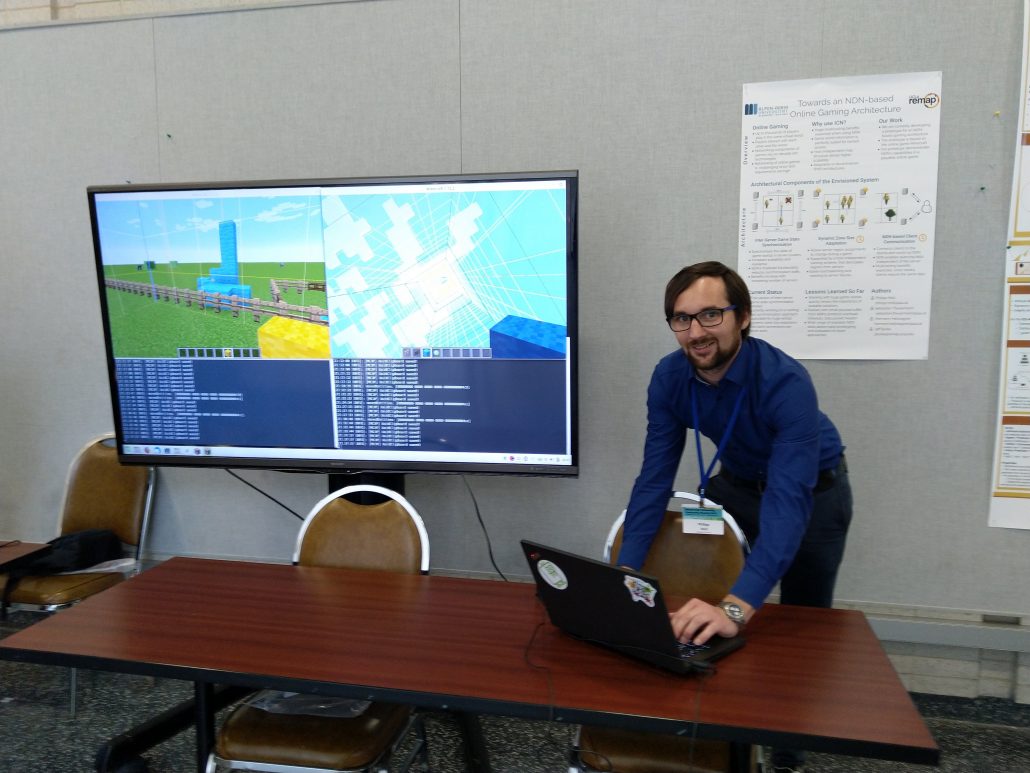 In the course of his research stay at UCLA, Philipp Moll attended the NDN Community Meeting 2019 and presented his work “Towards an NDN-based Online Gaming Architecture”.
In the course of his research stay at UCLA, Philipp Moll attended the NDN Community Meeting 2019 and presented his work “Towards an NDN-based Online Gaming Architecture”.
Abstract: The popularity of online games increased steadily during the last decades and nowadays games play an important role in the entertainment industry. Although the rising popularity of online games goes hand in hand with increased complexity of technical challenges, the networking stack of online games is built on decades-old technologies, which were never intended to be used in games, and is often responsible for crashing game servers during peak hours. Replacing the currently used connection-oriented networking approach by a content-centric architecture could yield advantages reaching beyond avoiding inefficiencies found in IP-based online games. We propose an NDN-based system for Massive Multiplayer Online Role-Playing Games (MMORPGs) which tackles issues found in IP-based systems.
Authors: Philipp Moll, Sebastian Theuermann, Hermann Hellwagner (Klagenfurt University), Jeff Burke (UCLA)
Links:
- NDN Community Meeting: https://www.nist.gov/news-events/events/2019/09/ndn-community-meeting
- Poster: NDNComm_Poster

